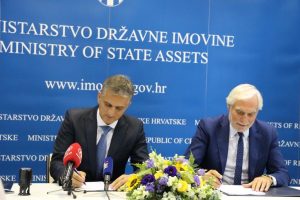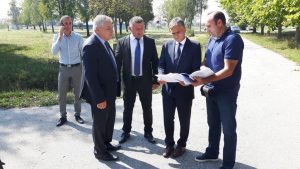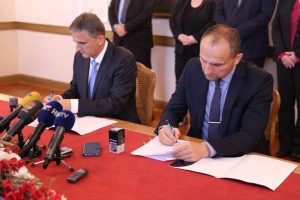We want to activate and make functional all state-owned property. Hence, we are going to continue undertaking required measures for the more effective use of all forms of state property with the view of achieving economic growth and protecting national interests.
The Minister of State Property, Goran Marić, is one of those government members that cannot say that he doesn’t have enough work to do. On the contrary, since the Law on State Property was passed, the Ministry has been focusing on bringing order into this field which has been neglected for a very long time.

1. How satisfied are you with the implementation of the Law on State Property Management? Will you manage to utilize all the funds before the envisaged deadline?
The Law on State Property Management brought significant novelties and changes in the status and activation of state property in the economic and business segment and in local government units. The law defines what constitutes state property managed by the Ministry. We are satisfied with that, as well as with the dynamics of its implementation. In terms of the physical volume, it is impossible to activate something that has been neglected for 25 years in such a short time. We need to carry out numerous status insights, like geodetic substrates, size, surface, ownership and ownership shares, value evaluations and other, for each facility and each property, prior to the activation process. The Ministry carries out its activities according to the devised plans for each period that are, generally speaking, appropriately implemented.
The new Law on State Property Management has created prerequisites for the simpler and faster implementation of procedures and execution of legal activities on the activation of state property. The number of realized legal activities involving state property depends on demand and market conditions. There are some properties which status requires more procedures that are more demanding and more complex. The aim is for the overall state property portfolio to serve real needs according to its best capabilities and solvency.

2. What is your assessment of the financial effects of this law?
The Law on State Property Management entered into force on June 14th, 2018, and the relevant bylaws, passed under the law, entered into force in early November. This is a very short time, and it’s too early to evaluate the financial impact of the law and its bylaws. The effects of the law can best be seen in the results that the Ministry of State Property achieved in 2018 on changing/reducing the government’s portfolio and activation of unused state property.
In 2018, a total of 649 contracts were concluded, of the total value of 329.8 million kunas, in the real estate management segment. Total income from nonfinancial assets (real estate management) in 2018 amounted to 217 million kunas, up by 106% relative to the previous year.
In terms of financial assets, in 2018, the proceeds from the sale of shares and business shares in non-strategic trade companies amounted to 446.1 million kunas. Furthermore, the Ministry of State Property also generated revenues from financial assets amounting to 23.5 million kunas. Thus, the total financial effect in 2018 was 1 billion kunas.

3. How is state property management organized now? How transparent is it and how can it be further improved?
One of the bad practices and a paradigm in the democratic Croatia that simply had to be immediately changed was the status of the property and its management. The newly formed Ministry of State Property took upon itself to change the existing practice, to implement this novelty, and assume the role and responsibility during the current term of the government of the Republic of Croatia.
In regard to property, it is obvious that property and ownership are fundamental, constituent attributes of a state. The assets of the Republic of Croatia managed by the Ministry of State Property can serve economic growth and development through a strong activation. With a clear and transparent approach, state property must operate along the market principles and relations and benefit the state budget, as well as those who live with next to it and in its surroundings. Our fundamental intention is to boost entrepreneurial ideas, choose the best ones and through activation of property multiply its value with the help of good, open communication with all target groups. Certainly, many inherited weaknesses from earlier times and non-democratic systems, when the property had an inappropriate/non-marketable status, are the aggravating facts.
Along with everything that has been done, improvements are possible through additional engagement of professional and competent people, upgrading and adapting laws and further reducing administrative constraints.

4. What are your future plans?
There is a lot of work ahead of us in the upcoming period because the property of the Republic of Croatia has been neglected and abused for many years. Our end goal is to dispose of and manage the state property in a sustainable, economically prudent and transparent way which we are planning on doing through efficient management of real estate, movable assets, privatization of companies owned by the Republic of Croatia and improvement of the management of legal entities of special interest in our country.
We want to activate and make functional all state-owned property. Hence, we are going to continue undertaking required measures for the more effective use of all forms of state property with the view of achieving economic growth and protecting national interests.
Furthermore, the Ministry of State Property will continue to systematically work on finding and implementing solutions for state property management that can contribute to the higher efficiency of public services.

5. What role do European structural funds have in the implementation of your plans? Is there a possibility of withdrawing money from these funds for some of your projects and if there is, for which ones?
The Ministry of State Property is not eligible to use EU funds, but it does use other available co-financing or financing means for certain activities and projects. It withdraws funds from the European structural and investment funds (ESI) through the implementation of the Ministry’s technical assistance project; allocation of grants from the Priority Axis 10 – Technical Assistance of the Operational Programme Competitiveness and Cohesion 2014-2020. The European Regional Development Fund co-finances the project with 85% and 15% of the funds come from the budget of the Republic of Croatia. The total value of the project is 8,220,818 kuna, of which 6,987,695.27 kunas are co-financed by the European Union.
The project supports the implementation of the Operational Programme ‘Competitiveness and Cohesion’ by building up the administrative capacity of the Ministry of State Property as a horizontal body that conducts expert activities. The Ministry of State Property will contribute to the more efficient use of the European Structural and Investment Funds by prioritizing the financing of the EU-funded cases and projects. The project is being implemented in the period from 2018 to 2022.
Apart from applying for ESI funds, the Ministry has also been successfully applying for funds provided by the European Commission related to adapted technical assistance (expert assistance) under the Structural Reform Support Programme as a stimulus to sustainable growth and resolution of the issues regarding the European Semester or the implementation of other national reforms. I have already mentioned the project ‘Improving the Management and Formation of Single Reporting and Supervision of State-owned Enterprises’ and the ongoing projects ‘Improving the Competencies of Supervisory Boards in State-owned Enterprises – Restructuring of State-owned Trade Enterprises’ which total value stands at 800,000.00 euro.
6. Part of the state property is also the assets that the state has in various enterprises. Can you tell us more about this segment of the law implementation?
The assets of state-owned companies are actually the assets that companies have and manage in accordance with the Company Law. The responsibility for the management lies solely with the managing and supervisory boards of companies. The treatment of this property is regulated by the provisions of this Law, which states, in Article 6: “This Law is not applicable to the property of the Republic of Croatia which, under special regulations, is administered by other bodies of the Republic of Croatia or by legal entities of which the Republic of Croatia is a member or founder. The assets of legal persons, which are founded or co-founded by the Republic of Croatia, are not considered state assets managed by the Ministry. These assets are managed by the said legal entities.” It is, therefore, important for the Republic of Croatia to be responsible when appointing members of managing boards in companies that make final decisions.